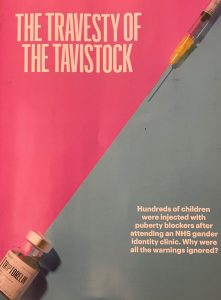
The Sunday Times ran a series of articles based on a newly released book by Hannah Barnes, exposing in much greater depth than anyone anticipated the medical scandal at the Tavistock Gids clinic which catered to children apparently suffering from gender dysphoria. The Times’ headline compared this travesty of medical care to the East German doping scandal. Hannah Barnes who is a journalistic heavy-hitter from the BBC Newsnight spoke to dozens of clinicians who worked at Gids, governors at the trust and children and their parents who used the service. From the lead article :
She details how:
• Children as young as three, already living as the opposite gender with a changed name, appearance and pronouns, were referred to the service.
• The clinic accounted for almost 30 per cent of the Tavistock NHS Trust’s income by 2021 and staff said it resembled a “tech start-up” with regular trips to international conferences.
• In 2016, Susie Green, former head of the pro-trans charity Mermaids, emailed Dr Polly Carmichael, who was then the head of Gids, asking to cut the time children had to spend on puberty blockers before irreversible cross-sex hormones could be introduced.
• Staff raised concerns when, on behalf of families, Green requested children’s clinicians to be changed to someone believed to be more likely to prescribe hormones.
• In her first interview since winning an employment tribunal case after she raised concerns about the safety of children, the trust’s head of safeguarding, Sonia Appleby, said anyone who spoke out was “demonised”.
• Former therapists involved in prescribing puberty blockers now admit they do not know “how many children [have since] changed their mind” on transitioning.

Staff at Tavistock and Gids like Dr Anna Hutchinson who joined the unit in 2013 had many moments of unease building up to alarm and finally culminating in a self-described moment of realisation : The holy f*** moment I knew something was wrong at the Tavistock.
Dr Hutchinson describes the ‘phenomenal’ surge in numbers, especially of pubescent girls, the lack of referral criteria, the number of children in abusive homes or in care, the complex mental health issues that came bundled with the apparent gender dysphoria, the routine referring of under-16s for puberty blockers at Gids. Dr Hutchison had faith in the blockers initially as her seniors assured her that the blockers were harmless and reversible. The blockers were meant to provide a pause, a breathing space for the kids’ mental health (based on clinical measures of things such as self-harm, suicidal ideation and body image) to stabilise or improve. Instead they worsened or remained the same. The she was confronted by the 100% correlation between the those on the blockers and those who went on to medically transition. The blockers seemed to be consolidating gender dysphoria rather than alleviating it. Reliable research suggests that puberty itself is the cure for gender dysphoria as up to 80% of adolescents desist from gender dysphoria as they grow and mature.
She grew alarmed as the presentation continued. Despite the idea that blockers were administered to provide children with more time to think, it was becoming clear that they were all thinking in the same way. In an astonishing aside, the researchers revealed that everyone in the early intervention group had at this point progressed from the blockers on to cross-sex hormones — a treatment with irreversible consequences. Every single one. It was Hutchinson’s “holy f***” moment. And a wake-up call for so many of her colleagues too.
Hutchinson approached the Tavistock’s Freedom to Speak Up guardian in 2017 to express her doubts, along with four other colleagues. That same year, another four clinicians took their concerns outside Gids to the children’s safeguarding lead for the Tavistock trust. So that’s at least 9 in a single year.
Hadley Freeman interviews Barnes and we learn that Barnes had great difficulty getting publishers for her book despite her sterling credentials as an investigative journalist.
“None of the big publishing houses would take it,” she says. “Interestingly, there were no negative responses to the proposal. They just said, ‘We couldn’t get it past our junior members of staff.’ ”
That’s a depressingly familiar story now. Relatively junior staff at publishing houses, newspapers, universities and even Netflix seem to have veto rights over content that displeases them. Barnes has been attacked on social media for her book – that’s par for the course. But apart from the Daily Mail, no other major media seems to have given this major medical scandal the coverage it deserves, not even her employer. I will let Mary Harrington have the last word.
If there’s a lesson from Rotherham and now the Tavistock, it’s that the road to “diversity” is paved with the bodies of pubescent girls
— Mary Harrington (@moveincircles) February 12, 2023


